Ask 100 people and you'll get about 200 different answers about water intake.
Please note that this is more of a presentation of differing views concerning water consumption backed by input from people with access to a LOT of specific information on the topic. I urge everyone to be aware of their activity levels, food intake, body constitution and the innate feedback they get from their bodies and to make reasoned choices based on all these points. See your medical or sports doctor before making changes in your diet, liquid intake or exercise regimes.
The "half-a-gallon-a-day" camp.
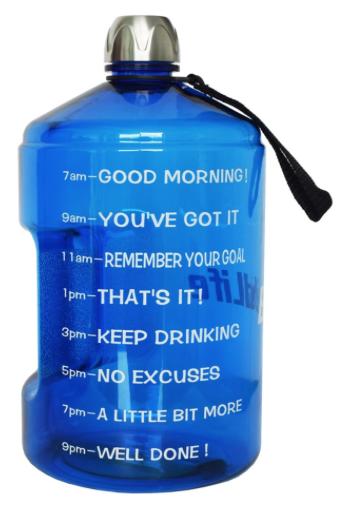
The latest Institute of Medicine recommendation is that women should strive for about two liters or eight glasses a day and men should aim for three liters or 12 glasses a day of any fluid, not just water. “No one can figure out where this ‘eight glasses of water’ came from, but (it may have come from) old RDA [recommended daily allowance] for water that matched water requirements to calorie requirements,” notes Georgia Chavent, MS, RD, director of the Nutrition and Dietetics Program at the University of New Haven in West Haven, Conn. Previously, only water was allowed to count as, well, water. But, they've loosened up a bit and allow "any fluid" [that would be non-alcoholic liquids- sorry] . But, that doesn't hold up if all you drink is coffee, so caveat emptor.
Other experts say that 1/2 ounce of water per pound of body weight is the correct intake, which seems kind of logical. So, if you weigh 180 pounds, you would need 90 ounces of water. But, even this doesn't hold up for everyone, either. Body composition percentages DIFFER WIDELY. ( The basic guideline is that you need an ounce of water to process an ounce of food.) Higher protein intake, however, needs higher water intake, so body builders need to ramp up their water intake to allow allow that protein powder to be assimilated.
The "drinking water helps you lose weight" camp.

Drinking water won’t trigger weight loss PER SE, but it CAN aid in the process. Water replaces other calorie-loaded beverages in the diet, causing you to reduce your overall number of calories if you replace the Dew with H2O. Plus, taken about 30 minutes before eating, it can make you feel fuller, so you may eat less at each meal.
Water, particularly cold water, may even play a role in increasing your metabolism. “A new study seems to indicate that drinking water actually speeds up weight loss,” says Tanya Zuckerbrot, MS, RD, owner of Tanya Zuckerbrot Nutrition, LLC, in New York City. “Researchers in Germany found that subjects of the study increased their metabolic rates [or the rate at which calories are burned] by 30 percent after drinking approximately 17 ounces of water.”
Well, ok, but there are many OTHER studies that say the temperature makes very little difference in the absorption and use of the water, and that the timing (about 30 minutes before eating) is the crucial factor.
The "if you are thirsty, you are ALREADY dehydrated" camp.
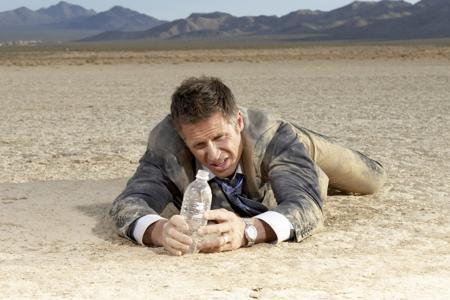
If you start to feel thirsty, then you are headed in the wrong direction and should grab a drink of water, but thirst doesn’t necessarily mean you’re dehydrated. AND, this totally depends on how you define dehydration. Dehydration symptoms include headache, fatigue, dizziness, muscle cramp, low blood pressure, and in severe instances, loss of consciousness and kidney failure. Taking long intervals between drinking water might dry up the throat a little, but there is no risk of becoming dangerously dehydrated.
The body first realizes the thirst sensation when the blood is thickened by 2%. So your body will surely feel less energetic if you consume less water, but that isn't enough to be called "dehydration" per se.
“Thirst begins when the concentration of [substances in the] blood has risen by less than 2 percent, whereas most experts would define dehydration as beginning when that concentration has risen by at least 5 percent,” notes Amy Hess-Fischl, RD, CDE, of the University of Chicago Kovler Diabetes Center
The "you need sports drinks, not water, for typical athletics" camp.
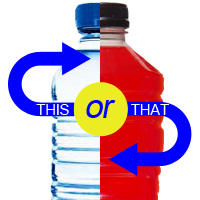
Sports drinks may have fancier advertising campaigns, but water is really all you need to get the fluid necessary to participate in most athletic endeavors. [ emphasis added] “Adequate fluid, especially water, is most important for athletes of all ages as it is the single most important way the body has to transport nutrients and energy and remove heat during exercise,” says experts. “A sports or vitamin beverage may taste better, but is not necessary for hydration and is expensive.”
Keep in mind though that people who run marathons or compete in highly strenuous activites may need to supplement their water intake with sports drinks to offset the salt they lose due to heavy sweating over long periods of time. This doesn’t apply to most people, however, who are simply exercising to get fit at the gym.
So for most of us, regular water intake during or exercise is fine. If you like, have a few pretzels to add some salt and electrolytes.
The "it's possible to drink too much water" camp.
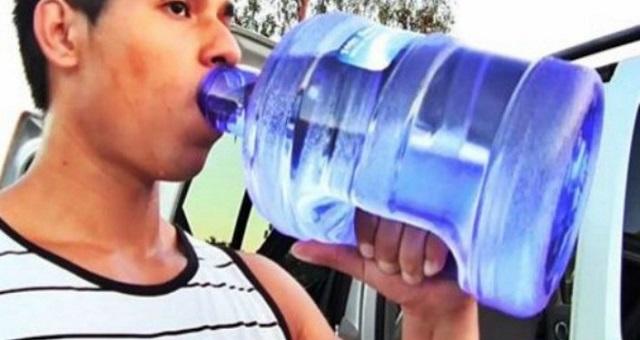
People with certain health conditions can put themselves at risk of complications if they drink too much water. “People with some heart conditions, high blood pressure, or swelling of the lower legs [edema] need to avoid excess water,” says Hess-Fischl. So, if you have a history of kidney problems, especially if you have had a transplant, consult your doctor before increasing your fluid intake. And you shouldn't drink too much water while eating, as it dilutes your stomach acid and can cause digestion problems.
The bottom line?
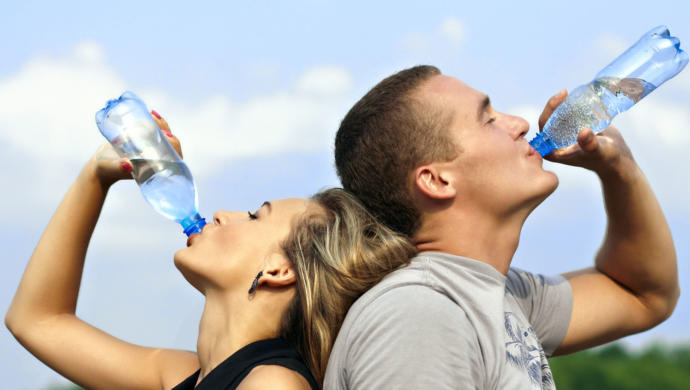
So I will repeat what I said at the beginning of this take. I urge everyone to be aware of their activity levels, food intake, body constitution and the innate feedback they get from their bodies and to make reasoned choices based on all these points. See your medical or sports doctor before making changes in your diet, liquid intake or exercise regimes. In short? Think when you drink!
 Holidays
Holidays  Girl's Behavior
Girl's Behavior  Guy's Behavior
Guy's Behavior  Flirting
Flirting  Dating
Dating  Relationships
Relationships  Fashion & Beauty
Fashion & Beauty  Health & Fitness
Health & Fitness  Marriage & Weddings
Marriage & Weddings  Shopping & Gifts
Shopping & Gifts  Technology & Internet
Technology & Internet  Break Up & Divorce
Break Up & Divorce  Education & Career
Education & Career  Entertainment & Arts
Entertainment & Arts  Family & Friends
Family & Friends  Food & Beverage
Food & Beverage  Hobbies & Leisure
Hobbies & Leisure  Other
Other  Religion & Spirituality
Religion & Spirituality  Society & Politics
Society & Politics  Sports
Sports  Travel
Travel  Trending & News
Trending & News
Most Helpful Opinions